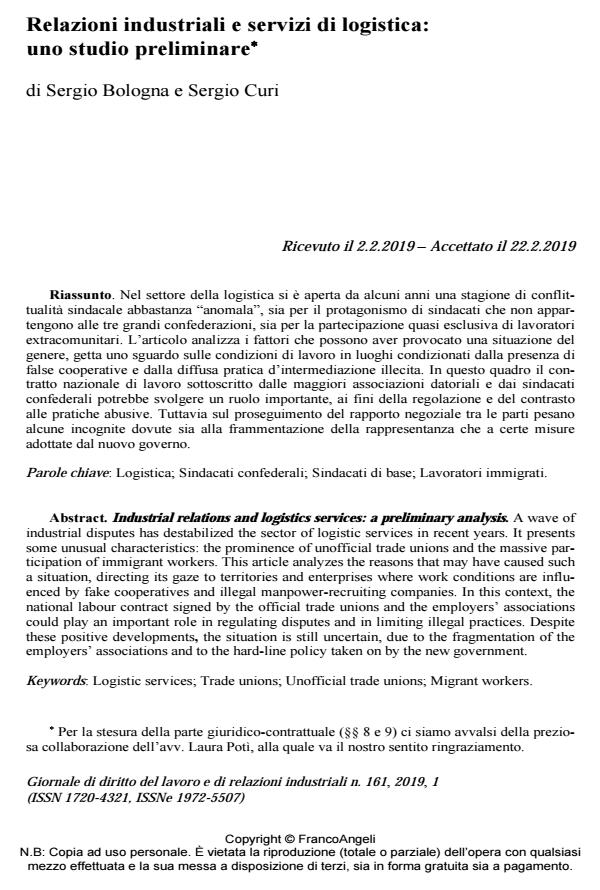Industrial relations and logistics services: a preliminary analysis
Journal title GIORNALE DI DIRITTO DEL LAVORO E DI RELAZIONI INDUSTRIALI
Author/s Sergio Bologna, Sergio Curi
Publishing Year 2019 Issue 2019/161 Language Italian
Pages 32 P. 125-156 File size 392 KB
DOI 10.3280/GDL2019-161006
DOI is like a bar code for intellectual property: to have more infomation
click here
Below, you can see the article first page
If you want to buy this article in PDF format, you can do it, following the instructions to buy download credits

FrancoAngeli is member of Publishers International Linking Association, Inc (PILA), a not-for-profit association which run the CrossRef service enabling links to and from online scholarly content.
A wave of industrial disputes has destabilized the sector of logistic services in recent years. It presents some unusual characteristics: the prominence of unofficial trade unions and the massive participation of immigrant workers. This article analyzes the reasons that may have caused such a situation, directing its gaze to territories and enterprises where work conditions are influenced by fake cooperatives and illegal manpower-recruiting companies. In this context, the national labour contract signed by the official trade unions and the employers’ associations could play an important role in regulating disputes and in limiting illegal practices. Despite these positive developments, the situation is still uncertain, due to the fragmentation of the employers’ associations and to the hard-line policy taken on by the new government.
Keywords: Logistic services; Trade unions; Unofficial trade unions; Migrant workers.
- Bologna S. (2017). Il ‘lungo autunno’: le lotte operaie degli anni 70. In: Amatori F., a cura di, L’approdo mancato. Economia, politica e società in Italia dopo il miracolo economico. Annali della Fondazione Feltrinelli 2017. Milano: Feltrinelli, 111 ss.
- Chiaromonte W. (2018). «Cercavamo braccia, sono arrivati uomini». Il lavoro dei migranti in agricoltura fra sfruttamento e istanze di tutela. DLRI: 321 ss.
- Frosecchi G. (2018). Distacco, cabotaggio e trasporto internazionale: un puzzle ancora da comporre. RGL, I: 39 ss.
- Kübler A., Distel S., Veres-Homm U., a cura di (2015). Logistikbeschäftigung in Deutschland. Vermessung, Bedeutung und Struktur. Fraunhofer IIS.
- Gaddi M. (2018). Le conseguenze sul lavoro delle innovazioni tecnologiche e organizzative nelle aziende reggiane. Primo report per il congresso della CdL territoriale di Reggio Emilia, 23-24 ottobre 2018.
- Mete V. (2018). Mafie e autotrasporto. Appunti per un’analisi. RGL, I: 135 ss.
- Scuola europea di relazioni industriali - Fondazione Brodolini (2018). Lavoro e organizzazione della logistica 4.0.
- Unioncamere Emilia-Romagna, Ervet (2018). I numeri a supporto dell’individuazione delle false cooperative.
- The Worker Capabilities Approach: Insights from Worker Mobilizations in Italian Logistics and Food Delivery Lorenzo Cini, Bartek Goldmann, in Work, Employment and Society /2021 pp.948
DOI: 10.1177/0950017020952670 - Valori e tecniche nel diritto del lavoro Bruno Caruso, Loredana Zappalà, pp.29 (ISBN:978-88-5518-483-0)
- Mobilizing against the odds. Solidarity in action in the platform economy Donatella della Porta, Riccardo Emilio Chesta, Lorenzo Cini, in Berliner Journal für Soziologie /2022 pp.213
DOI: 10.1007/s11609-022-00471-z - Digital Supply Chains and the Human Factor Riccardo Emilio Chesta, pp.181 (ISBN:978-3-030-58429-0)
- Dalla sofferenza alla convergenza: attori e luoghi della partecipazione nel caso Mondo Convenienza Antonella Verduci, in ECONOMIA E SOCIETÀ REGIONALE 3/2024 pp.91
DOI: 10.3280/ES2023-003006 - Relazioni industriali e nuove tecnologie: conflitto, partecipazione e concertazione nell'era del lavoro digitale Matteo Turrin, in ECONOMIA E SOCIETÀ REGIONALE 3/2022 pp.55
DOI: 10.3280/ES2022-003006
Sergio Bologna, Sergio Curi, Relazioni industriali e servizi di logistica: uno studio preliminare in "GIORNALE DI DIRITTO DEL LAVORO E DI RELAZIONI INDUSTRIALI " 161/2019, pp 125-156, DOI: 10.3280/GDL2019-161006